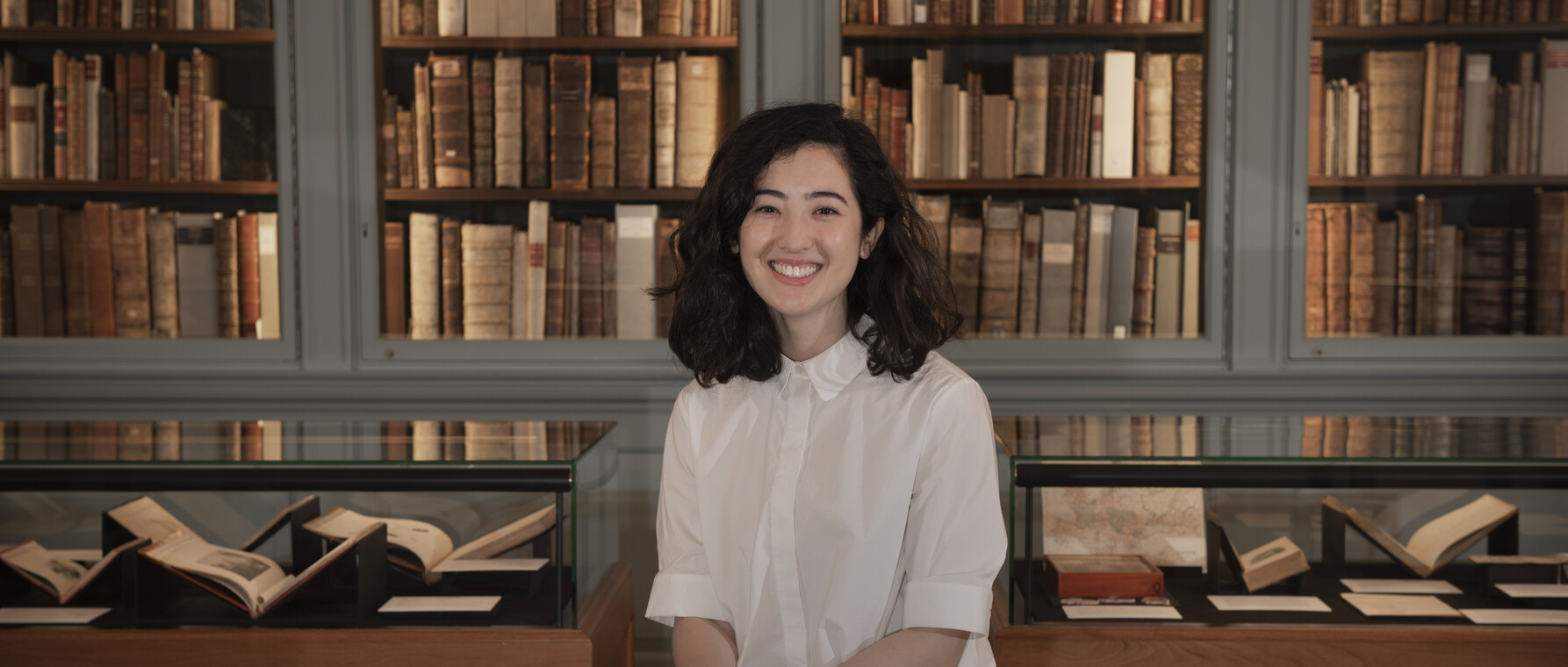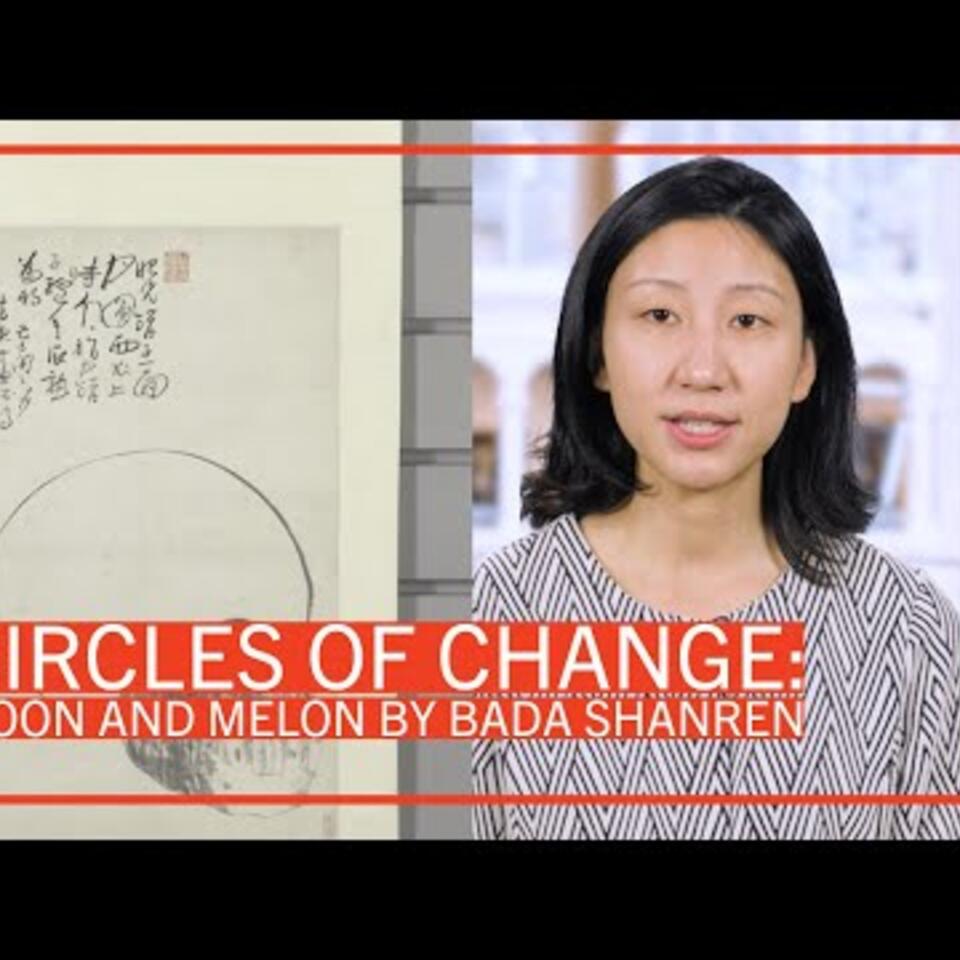Origin Story
Alexandra Schultz studies the rise of the public library, in the process shedding light on the true story of the Library of Alexandria.

Alexandra Schultz is a PhD candidate in the classics and 2019 Harvard Horizons Scholar. Schultz fell in love with the Latin and Greek languages as a child and went on to study the ancient world. Her research on monumental libraries overturns what we think we know about the world’s most famous library.
How did you develop an interest in the classics?
I’ve loved learning languages since I was a child. When I was young, my mother bought me a book that explained the Greek and Latin roots of words like “tele-phone” and “tele-scope” and “micro-scope.” I remember the delight and sense of accomplishment it brought me to learn the roots of words, to understand not just their meanings but their components and origins. In high school, I started studying ancient Latin and Greek and fell in love. Over the years my enthusiasm for the languages gradually morphed into a passion for the literature and the ancient world more broadly.
Tell me about your research.
I work on a period of history called the Hellenistic period (323–31 BCE), the centuries after Alexander the Great’s conquest of the Persian empire that took him from Greece to India. During this period, a new type of book collection emerged in cities around the Mediterranean and Near East. For millennia, private libraries and administrative archives had been crucial resources for kings, scribes, priests, doctors, and more, who depended on books and documents to govern and practice their professions. But in the Hellenistic period, we find for the first time large, public-facing libraries in major cities from modern day Italy to Afghanistan, the most famous one being the Library of Alexandria in Egypt. Hellenistic kings bragged about founding royal libraries, aristocrats poured money into civic libraries, and ordinary people, most of whom were illiterate, knew that they were walking past these libraries every day.
Ancient historians and literary scholars have long been fascinated by the development of Hellenistic libraries, and rightly so: Libraries are at the intersection of knowledge and power, and the development of Hellenistic libraries influenced literary production, scientific innovation, education, political propaganda, and more during this period. And yet, the way that these libraries developed as institutions, and the causes behind this change, are still poorly understood. One key reason is that modern scholars tend to base their analyses on detailed and compelling, but largely fictitious ancient literary sources about the development of libraries. These ancient sources claim that the Library of Alexandria was the first Hellenistic library, invented by King Ptolemy I, and served as the model for all other libraries in the Hellenistic period.
In my research, by analyzing literary texts, inscriptions, papyri, and archaeological data, I approach the development of Hellenistic libraries from two angles: first, how did libraries develop as institutions, and second, what ideas about libraries circulated in antiquity?
What have you discovered?
What I’ve found is that the development of libraries as institutions is more complicated than the narrative most scholars believe. The development of Hellenistic libraries was a slow, gradual process that took place throughout the Mediterranean and Near East and depended on many factors, such as changes in education, book culture, and the ways that kings and aristocrats invested their money. I then use my findings about the development of libraries as institutions to ask why ancient literary accounts of libraries, especially about the Library of Alexandria, departed so radically from historical reality. I argue that in literary sources, libraries act as powerful metaphors for empires. For example, many stories describe book collections being transferred from Athens to Alexandria to Rome as people buy, steal, and plunder them. Rather than interpreting these elaborate stories as evidence for real historical events, I argue that the transfer of books became a potent metaphor for the transfer of power, from library to library, and from empire to empire.
Why is it important to study ancient libraries, and how does that study connect with the “idea” of Greece?
Ancient libraries, and especially the Library of Alexandria, play an important role in how scholars think about the classical world. Often this leads to exciting new discoveries that change how we think about the past and give us insight into the world today. However, some scholars have also uncritically treated libraries as evidence for the supposed superiority of Greek literature and scholarly achievement, and as part of a seductive narrative of cultural continuity that links classical Athens to Alexandria to Rome, and ultimately to “Western civilization” today. Such idealizing and teleological notions about the ancient world to a large extent derive from the political concerns of scholarship of the last few centuries, in which the ancient world has often been interpreted to serve various ideological ends.
We need history to make sense of our past and the world around us, to explain where we come from and why things are the way they are.
–Alexandra Schultz
Yet as I have come to realize, scholarly interpretations of ancient libraries are not just byproducts of these modern biases: Ancient libraries are also in part their causes. Ideas of cultural superiority and continuity were present already in the ancient world during the Hellenistic period, and they were constructed in part through libraries: both as formal institutions that promoted ideas about Greek literature and cultural power and as symbols of political power that were highly romanticized in literary depictions. This is all to say that there was nothing superior about the Greek alphabet, language, literature, or “thought” that led to the inevitable emergence of institutional libraries in Greece. Rather, the library is a part of a long process of active attempts to make Athens synonymous with Greece, to create out of a diverse body of texts composed in different Greek dialects a canon of Greek literature, and to construct ideas about Greece through its literature and culture. This is the contention of my research: that the histories, real and imagined, of Hellenistic libraries played an important role in shaping ideas about Greece. Ultimately, we need to study ancient libraries in order to better understand our own ideas about Greek literature, Greece, and the origins of the so-called Western canon.
What relevance does studying the classics have to today?
Historically, one common argument for the enduring relevance of the classics is that they constitute the origins of “Western civilization” because we can trace the roots of democracy, philosophy, literature, art, science, etc. back to Greece and Rome. Homer’s Iliad, Aristotelian philosophy, and Roman imperial ideology, to take a few examples, have inspired influential thinkers for millennia, from early Christian theologians to Renaissance humanists to present-day intellectuals. But we should be wary of why and how people treated these particular civilizations (and a very narrow dimension of these civilizations at that) as entities worthy of study.
I think what is exciting about studying the classics today is that people are increasingly looking at Greece and Rome as civilizations that have been reconstructed selectively in order to support contemporary systems of belief, often to justify why some groups wield power over others. If we stop idealizing the classics as the de facto origins of the West, we can critically reexamine them alongside the aspects of contemporary society supposedly rooted in classical antiquity. For example, the US and many countries around the world today are facing a crisis of democracy, an institution we associate with classical Athens. But, as scholars are increasingly acknowledging, Athenian democracy was predicated on the subjection of hundreds of thousands of women and slaves to free-born men, and it was supported by a complicated ideological system that justified this social and political hierarchy. What we now know about the ancient world urges us to consider the vast inequalities that characterize many modern democracies and the ideological patches that conceal their failings.
Approaching the classics in this way can also help us see what aspects of the past have not been treated as worthy of study, due to narratives about the cultural superiority and exceptionalism of ancient Greece and Rome. Not only have women, slaves, “barbarians,” and more been written out of our histories of Greece and Rome, but these two civilizations existed alongside, and were indeed heavily influenced by, the many other civilizations that flourished around the Mediterranean and Near East in antiquity. Egypt, Neo-Assyria, Phoenicia, and Persia were characterized by sophisticated political systems, extraordinary literary and artistic achievements, and groundbreaking scientific and technological progress. And these civilizations, as well as Greece and Rome, featured incredible cultural, ethnic, and linguistic diversity. We need history to make sense of our past and the world around us, to explain where we come from and why things are the way they are. But by asking new questions about the ancient world and studying it in all its richness, we can also disrupt false narratives of continuity between the past and present, and see the present in a more critical light.
What are your plans for the future?
For now, keep writing about libraries for my dissertation! I have a few side projects that I’m working on too: a history of alphabetization in the ancient Greek world and a feminist reading of one of the new poems of Sappho discovered in 2014.
Soon I’ll be applying for jobs. Ideally, I’ll be able to continue researching libraries and the role of literature in people’s lives (somewhere with a great library, of course), alongside teaching and nurturing the intellectual development of both undergraduates and graduate students. Wherever I end up, I never want to stop challenging people’s ideas about the ancient world—most of all my own.
Photo by Stu Rosner
Get the Latest Updates
Join Our Newsletter
Subscribe to Colloquy Podcast
Simplecast





